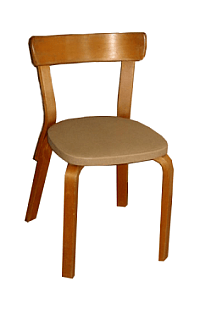Definify.com
Definition 2026
աթոռ
աթոռ
Armenian

Noun
աթոռ • (atʿoṙ)
Declension
| singular | plural | |||
|---|---|---|---|---|
| nominative | աթոռ (atʿoṙ) | աթոռներ (atʿoṙner) | ||
| dative | աթոռի (atʿoṙi) | աթոռների (atʿoṙneri) | ||
| ablative | աթոռից (atʿoṙicʿ) | աթոռներից (atʿoṙnericʿ) | ||
| instrumental | աթոռով (atʿoṙov) | աթոռներով (atʿoṙnerov) | ||
| locative | աթոռում (atʿoṙum) | աթոռներում (atʿoṙnerum) | ||
| definite forms | ||||
| nominative | աթոռը/աթոռն (atʿoṙə/atʿoṙn) | աթոռները/աթոռներն (atʿoṙnerə/atʿoṙnern) | ||
| dative | աթոռին (atʿoṙin) | աթոռներին (atʿoṙnerin) | ||
| 1st person possessive forms (my) | ||||
| nominative | աթոռս (atʿoṙs) | աթոռներս (atʿoṙners) | ||
| dative | աթոռիս (atʿoṙis) | աթոռներիս (atʿoṙneris) | ||
| ablative | աթոռիցս (atʿoṙicʿs) | աթոռներիցս (atʿoṙnericʿs) | ||
| instrumental | աթոռովս (atʿoṙovs) | աթոռներովս (atʿoṙnerovs) | ||
| locative | աթոռումս (atʿoṙums) | աթոռներումս (atʿoṙnerums) | ||
| 2nd person possessive forms (your) | ||||
| nominative | աթոռդ (atʿoṙd) | աթոռներդ (atʿoṙnerd) | ||
| dative | աթոռիդ (atʿoṙid) | աթոռներիդ (atʿoṙnerid) | ||
| ablative | աթոռիցդ (atʿoṙicʿd) | աթոռներիցդ (atʿoṙnericʿd) | ||
| instrumental | աթոռովդ (atʿoṙovd) | աթոռներովդ (atʿoṙnerovd) | ||
| locative | աթոռումդ (atʿoṙumd) | աթոռներումդ (atʿoṙnerumd) | ||
Derived terms
Old Armenian
Etymology
The origin is uncertain.
Windischmann compared with Ancient Greek θρόνος (thrónos, “seat, throne”). The comparison was revived by Marr, who derived both from a “Japhetic” root in the framework of his discredited Japhetic theory.
Müller derived from Aramaic אתר (ʾtr), אתרא (ʾtrʾ, “place”), Classical Syriac ܐܬܪ (aṯar), ܐܬܪܐ (aṯrā, “place”), for the sense development comparing Persian گاه (gâh, “throne; place”). This was rejected by de Lagarde, Hübschmann and Ačaṙean, who left the origin open.
Hiwnkʿearpēyēntean derived from Turkish oturmak (“to take a sit”), oturak (“seat, stool”). Ačaṙean rejected the comparison because the older forms of the Turkic word contain an -l-: compare Chagatai اولتورمق (olturmaq, “to sit”).
Karst connected with Sumerian [script needed] (tur, “triclinium”).
J̌ahukyan and Olsen mark the origin as unknown, with J̌ahukyan remarking that աթոռ (atʿoṙ) is a late acquisition absent from Proto-Armenian.
Noun
աթոռ • (atʿoṙ)
- chair, seat; bench; throne
- նստուցանել յաթոռ ― nstucʿanel yatʿoṙ ― to make one sit on a throne or chair; to throne
- նստել յաթոռ ― nstel yatʿoṙ ― to sit on a chair or throne
- աթոռս արկանել ― atʿoṙs arkanel ― to give seats or chairs
- ելանել յաթոռոյ ― elanel yatʿoṙoy ― to rise up, to get up
- a seat used in evacuating the bowels or in urinating, stool
- (Biblical tradition) throne (the third highest order of angel in Christian angelology, ranked above minions and below cherubim)
Declension
| singular | plural | ||
|---|---|---|---|
| nominative | աթոռ (atʿoṙ) | աթոռք (atʿoṙkʿ) | |
| genitive | աթոռոյ (atʿoṙoy) | աթոռոց (atʿoṙocʿ) | |
| dative | աթոռոյ (atʿoṙoy) | աթոռոց (atʿoṙocʿ) | |
| accusative | աթոռ (atʿoṙ) | աթոռս (atʿoṙs) | |
| ablative | աթոռոյ (atʿoṙoy) | աթոռոց (atʿoṙocʿ) | |
| instrumental | աթոռով (atʿoṙov) | աթոռովք (atʿoṙovkʿ) | |
| locative | աթոռ (atʿoṙ) | աթոռս (atʿoṙs) |
Derived terms
|
|
|
Descendants
- Armenian: աթոռ (atʿoṙ)
References
- Ačaṙean, Hračʿeay (1971), “աթոռ”, in Hayerēn armatakan baṙaran [Dictionary of Armenian Root Words] (in Armenian), volume I, 2nd edition, Yerevan: University Press, published 1926–1935, page 89ab
- Awetikʿean, G.; Siwrmēlean, X.; Awgerean, M. (1836–1837), “աթոռ”, in Nor baṙgirkʿ haykazean lezui [New Dictionary of the Armenian Language] (in Old Armenian), Venice: S. Lazarus Armenian Academy
- Petrosean, H. Matatʿeay V. (1879), “աթոռ”, in Nor Baṙagirkʿ Hay-Angliarēn [New Dictionary Armenian–English], Venice: S. Lazarus Armenian Academy, page 4b
- de Lagarde, Paul (1877) Armenische Studien (in German), Göttingen: Dieterich, § 23, page 7
- Hiwnkʿearpēyēntean, Yovhannēs (1894), “աթոռ”, in Stugabanakan baṙaran hayocʿ lezui [Etymological Dictionary of the Armenian Language] (in Armenian), Constantinople: Tparan G. Paɫtatlean, pages 153–154
- Hübschmann, Heinrich (1897) Armenische Grammatik. 1. Theil: Armenische Etymologie (in German), Leipzig: Breitkopf & Härtel, page 300
- J̌ahukyan, Geworg (1987) Hayocʿ lezvi patmutʿyun; naxagrayin žamanakašrǰan [History of the Armenian language: The Pre-Literary Period] (in Armenian), Yerevan: Academy Press, page 264
- J̌ahukyan, Geworg (2010), “աթոռ”, in Sargsyan, Vahan, editor, Hayeren stugabanakan baṙaran [Armenian Etymological Dictionary] (in Armenian), Yerevan: Asoghik, ISBN 978-9939-50-121-5, page 24b
- Karst, Josef (1911), “Zur ethnischen Stellung der Armenier”, in Akinean, Nersēs, editor, Huschardzan. Festschrift aus Anlass des 100-jahrigen Bestandes der Mechitaristen-Kongregation in Wien (1811–1911), und des 25. Jahrganges der philosophischen Monatsschrift Handes amsorya (1887–1911) (in German), Vienna: Verl. der Mechitaristen-Kongregation, page 408
- Marr, N. Ja. (1935) Izbrannyje raboty [Selected Works] (in Russian), volume V, Leningrad, Moscow: Gosudarstvennoje socialʹno-ekonomičeskoje izdatelʹstvo, pages 76, 363
- Müller, Friedrich (1863), “Beiträge zur Lautlehre der armenischen Sprache”, in Sitzungsberichte der Kaiserlichen Akademie der Wissenschaften, Philosophisch-Historische Classe (in German), volume 41, page 11
- Müller, Friedrich (1894), “Pahlawi, neupersische und armenische Etymologien”, in Wiener Zeitschrift für die Kunde des Morgenlandes (in German), volume 8, page 280
- Windischmann, Friedrich (1846) Über die Grundlage des Armenischen im arischen Sprachstamme (in German), München: Königlich-Bayerische Akad. der Wiss., page 12